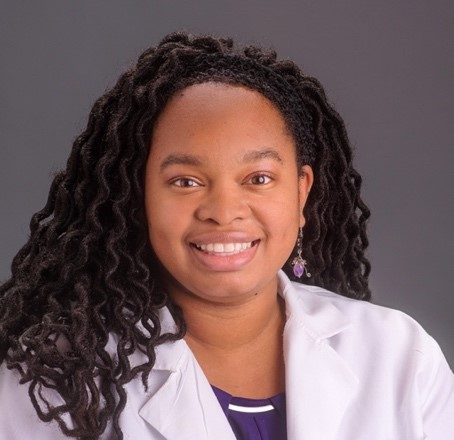Published on
Updated on

Vovanti Jones, M.D, Ph.D., always wanted to be a physician.
“My dad said the earliest I told him was at the age of 4,” she said. “So, I’ve always pursued science and medicine.”
Growing up in eastern North Carolina, where the closest hospital was more than 30 minutes away, she observed how a lack of access to care resulted in negative outcomes for people in her community. Jones felt it was important to address that in the community she served.
Today, the assistant professor of physical medicine and rehabilitation at Rusk Rehabilitation Hospital uses her passion for medicine to advocate for and help stroke patients through the rehabilitative process. Her ultimate goal is to make sure her patients can return to their homes – and in the process, help shape a more well-rounded community.
Built for this
Initially, Jones wanted to become an OB/GYN.
“I thought I was going to deliver babies. When I did my rotation, I loved it, but I realized that lifestyle wasn’t for me,” she said.
While in her senior year of college, Jones was diagnosed with muscular dystrophy, a genetic disease that causes progressive weakness and degeneration of skeletal muscles.
Jones debated whether she wanted to continue pursing medicine but after much self-reflection decided to complete her medical degree at Washington University in St. Louis.
While in medical school, mobility became more of an issue.
“I couldn’t let that determine what I was going to do. I learned how to provide care using a mobility scooter,” Jones said.

Using her gift
Jones currently serves as the medical director of the inpatient stroke rehab unit at Rusk Rehabilitation Hospital – an affiliation of Encompass Health and MU Health Care. She uses her medical gifts to encourage patients through the healing process.
“I work with the rehab team to come up with medical and rehabilitative plans for patients to help them try to reach their functional goals,” she said.
In addition to her clinical role, she instructs medical students and resident physicians, providing them with hands-on clinical experiences.
“The School of Medicine does problem-based learning based on patient cases. I’m bringing the clinical correlates from what they are reading on paper to showing them how we take care of patients in the community,” Jones said.
Growing as a leader
In addition to her academic and clinical responsibilities, Dr. Jones understands the importance of impacting the medical community through her involvement in national organizations and outreach.
“When I initially came to Mizzou, the chair of my department pushed me to get more involved,” she said.
This upcoming year she will take on a greater role serving as chair of the entire African American community for the American Academy of Physical Medicine and Rehabilitation.
“Coming into a community where you have other colleagues who understand the importance of having your face out there in the larger community helped grow my career,” Jones said. “My time here has allowed me to grow not only as an individual, but in my leadership skills and ability to address different people in different populations.”